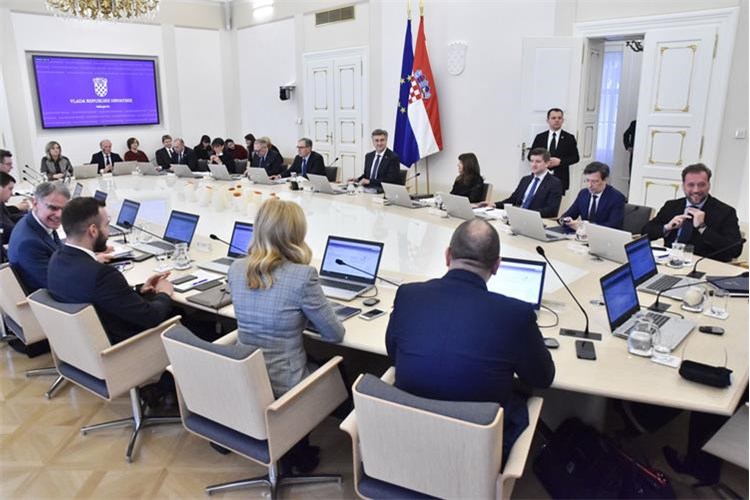The guarantee has been issued for an amount of HRK 187.6 million (€25.35 million) or equal to the amount required to reschedule the current, euro-indexed loan of HRK 230 million (€31.08 million) the PSP took from HBOR in 2015 at an interest rate of 2.5% per annum.
The new loan will be used for the early settlement of the unpaid principal and interest calculated up until the date of early settlement, fees and costs, Minister of Environment and Energy Tomislav Coric said.
Croatia to send humanitarian aid to Albania and Venezuela
Croatia will donate €1 million to Albania at a donor conference to be held in Brussels on 17 February. Albania will receive donations for reconstruction after a destructive earthquake hit that country in November last year, State-Secretary in the Ministry of Foreign and European Affairs Zdravka Busic informed the cabinet.
Prime Minister Andrej Plenkovic is expected to attend the Brussels conference.
On 26 November 2019, an earthquake of magnitude 6.4 hit Albania, resulting in 51 fatalities, with 1,000 people sustaining injuries while 4,000 people had to leave temporarily their homes. The disaster caused havoc to public and private infrastructure, hitting thousands of households and and thousands of buildings were seriously damaged, including schools and health care facilities.
The Croatian government responded immediately after the earthquake and sent food and other kinds of aid to the local population.
Five thermal vision cameras and 198 sets of police equipment to be donated to Bosnia
Croatia will send aid to Bosnia and Herzegovina following several requests by Bosnia and Herzegovina's Interior Ministry and the ministries of three cantons in the Federation of Bosnia and Herzegovina, and border police in those cantons, considering a rise in cross-border crime.
That represents a security challenge particularly in southern areas of the Federation entity that borders with Croatia, Busic explained.
Therefore Zagreb has decided to donate five thermal vision cameras and 198 sets of police equipment used in establishing public peace and order. The equipment is part of write-offs that the Croatian Ministry of Interior conducted last year.
USD 100,000 to be sent to Venezuela
Croatia will send USD 100,000 to Venezuela in order to procure medicines and basic hygienic products for vulnerable residents, including Croats and their descendants.
The crisis in Venezuela is one of the most critical humanitarian crises in the world at the moment, Busic said and more than four million people have left the country since 2015 in the wake of economic and political instability.
An estimated million people have left the country since the end of last year alone while 90% of the population is living in poverty.
Since 2016 the EU has allocated €90 million in humanitarian aid for the people in Venezuela and those who have fled to neighbouring countries.
Bills on resolution of credit institutions, Single Resolution Fund sent to parliament
The changes to the Act on the Resolution of Credit Institutions and Investment Companies concern the jurisdiction of national resolution bodies over credit institutions and groups of credit institutions for which direct responsibility is taken over by the Single Resolution Board by participating in the Single Resolution Mechanism as well as changes to the regulation on the resolution fund considering the mutualisation of contributions to the Single Resolution Fund.
Since there are several national resolution bodies in Croatia, the proposed legislative changes define their rights and obligations in the implementation of decisions and instructions by the Single Resolution Board for institutions under its direct jurisdiction.
Thus the Croatian National Bank (HNB) would have the responsibility and power to act in the implementation of decisions and instructions by the Single Resolution Board before the adoption of a decision on resolution while the State Agency for Deposit Insurance and Bank Resolution (DAB) would have the authority and power to act after the adoption of such a decision, said Finance Minister Zdravko Maric.
Funds in the resolution fund serve, aside from resolution, to meet the commitment of transferring contributions which institutions are obliged to pay into the Single Resolution Fund under a 2014 regulation, Maric said, adding that the contributions would be transferred to the Single Resolution Fund by DAB.
The HNB will be in charge of checking the validity of decisions of the Single Resolution Board in issuing fines that concern breaches of the said regulation.
Given that as of the date of establishment of close cooperation with the European Central Bank Croatia will be a country participating in the Single Resolution Mechanism, it has the obligation to ratify the Agreement on the Transfer and Mutualisation of Contributions to the Single Resolution Fund, said Maric.
Accordingly, contributions paid by credit institutions into the national resolution fund managed by DAB, will be transferred to the Single Resolution Fund.
The Single Resolution Fund will be filled over a period of eight years at the end of which it should reach the target level of at least 1% of the amount of insured deposits in all authorised credit institutions of all participating member-states. That amount is estimated at €60 billion.
The proposed bill authorises DAB to transfer, on Croatia's behalf, funds from the national resolution fund to the Single Resolution Fund. It also regulates the obligation to pay an additional contribution if the available national funds are insufficient for transfer to the Single Resolution Fund in the amount defined by the Single Resolution Board, said Maric.
Text: Hina

